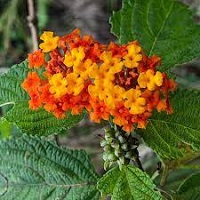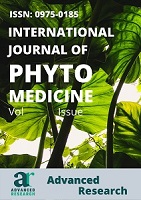Polyphenolic composition of Lantana camara and Lippia chevalieri, and their antioxidant and antimicrobial activities
Keywords:
Verbenaceae, HPLC-DAD, antioxidant activity, antimicrobial activity, polyphenolic compoundsAbstract
In the present study, the antioxidant and antibacterial activities of methanolic extracts of two Verbenaceae (Lantana camara L. and Lippia chevalieri Moldenke: aerial part) were investigated. Their polyphenolic composition in the ethyl acetate and aqueous fractions were characterized by HPLC-DAD. The antioxidant capability of the methanolic extracts was assessed by the Ferric Reducing Antioxidant Power (FRAP) and the scavenging activity of the free radical 2,2-diphenyl-1- picrylhydrazyl (DPPH). The Minimum Inhibitory Concentrations (MIC) of the methanolic extracts (25 µg mL-1), and the minimum bactericidal concentrations (MBC) (12.5 µg mL-1) against 13 pathogenic bacteria and four serotyped bacteria from the American Type Culture Collection (ATCC) were also determined by the solid agar dishes diffusion method. The results indicated that the L. chevalieri extracts are rich in phenolic compounds (among the 27 polyphenolic compounds detected, 20 belong to L. chevalieri) and showed the highest antioxidant activities, simultaneously on iron (III) to iron (II)- reducing activity and the radical scavenging activity. However, L. camara displayed the best and the broadest antimicrobial spectrum, especially on Shigella flexneri and Pantoea sp. (two Gram-negative strains of bacteria). The nature of polyphenolics compounds detected (phenol acid and flavone) in L. camara can justify this activity.
References
. Bouquet A. Féticheurs et médecines
traditionnelles du Congo (Brazzaville).
Mémoires O.R.S.T.O.M. N° 36, 1969,
p.
. Kerharo J. Traditional medicine and
sénégalaise pharmacopeia. Medical
studies, 1975, 49p.
. WHO, Strategy of WHO for Traditional
Medicine for 2002-2005.
WHO/EDM/TRM/2002.1, 2002.
. Gurib-Fakim A. Medicinal plants:
Traditions of yesterday and drugs of
tomorrow. Molecular Aspects of Medicine,
(2006), 1-93. DOI:
1016/j.mam.2005.07.008.
. Newman DJ, Cragg GM, Snader KM.
Natural Products as Sources of New
Drugs over the Period 1981- 2002.
Journal of Natural Products, 66 (2003),
-1037. DOI: 10.1021/np030096l.
. Krzaczkowski L. Investigation from
Bryophytes of pharmacological active
compounds in oncology. Pharmacology.
Ph.D. Thesis, University of Toulouse IIIPaul Sabatier, 2008, 202p.
. Ghisalberti EL. Lantana camara L.
(Verbenaceae). Fitoterapia, 71 (2000),
-486. DOI:
1016/S0367.326X(00)002.02-1
. Mevy JP, Bessiere JM, Dherbomez M,
Millogo J, Viano J. Chemical composition
and some biological activities of the
volatile oils of a chemotype of Lippia
chevalieri Moldenke. Food Chemistry,
(2007), 682–685.
DOI:10.1016/j.foodchem.2006.01.052.
. Nacoulma OG. Plantes médicinales et
Pratiques médicales Traditionnelles au
Burkina Faso: cas du plateau central
T1&T2.Thèse de Doctorat d’Etat ès
Sciences Nat. Université de
Ouagadougou, 1996.
. Pascual ME, Slowing K, Carretero E,
Sanchez Mata D, A. & Villar, Lippia:
traditional uses, chemistry and
pharmacology: a review. Journal of
Ethnopharmacology, 76 (2001), 201–214.
. DOI: 10.1016/S0378-8741(01)00234-3.
. Agra MF, Baracho GS, Nurit K, Basılio
IJLD, Coelho VPM. Medicinal and
poisonous diversity of the flora of “Cariri
Paraibano”, Brazil. Journal of
Ethnopharmacology, 111 (2007), 383-
DOI: 10.1016.jep.2006.12.007.
. Chowdhury JU, Nandi NC, Bhuiyan NI.
Chemical composition of leaf essential oil
of Lantana camara L. from Bangladesh.
Short communication. Bangladesh J. Bot.
(2) (2007), 193-194. DOI:
3329/bjb.v36i2.1513.
. Dua VK, Pandey AC, Dash AP.
Adulticidal activity of essential oil of
Lantana camara leaves against
mosquitoes. Indian J Med Res, 131
(2010), 434-439.
. Ganjewala D, Sam S, Khan KH.
Biochemical compositions and
antibacterial activities of Lantana camara
plants with yellow, lavender, red and
white flowers. EurAsia J BioSci, 3 (2009),
-77. DOI:10.5053/ejobios.2009.3.0.10.
. Geissler PW, Harris SA, Prince RJ, Olsen
A, Odhiambo RA, Oketch-Rabah H,
Madiega PA, Andersen A, Mølgaard P.
Medicinal plants used by Luo mothers
and children in Bondo district, Kenya.
Journal of Ethnopharmacology, 83
(2002), 39-54. DOI: 10.1016/S0378-
(02)00191-5.
. N’guessan K, Soro D, Amon ADE. Plants
used in traditional medicine in the
treatment of the cardiovascular diseases,
in country Abbey and Krobou, in the
South of Ivoiry Coast. Phytothérapie, 9
(2011), 199 - 208. DOI: 10.1007/s10298-
-0636-3.
. Bassole INH, Ouattara AS, Nebie R,
Ouattara AT, Kabore ZI, Traore SA.
Chemical composition and antibacterial
activities of the essential oils of Lippia
chevalieri and Lippia multiflora from.
Burkina Faso. Phytochemistry, 62 (2003),
-212. DOI: 10.1016/S0031-
(02)00477-6.
. Gasquet M, Delmas F, Timon-David P,
Keita A, Guindo M, Koita N, Diallo D,
Doumbo O. Evaluation in vitro and in vivo
of a traditional antimalarial, ‘Malarial-5.
Fitoterapia 64 (1993), 423-426.
www.cabi.org
. Hinneburg I, Dorman HJD, Hiltunen R.
Antioxidant activities of extracts from
selected culinary herbs and spices. Food
chemistry 97 (2006), 122-129. DOI:
1016/j.foodchem.2005.03.028
. Velazquez E, Tournier HA,
Mordujovichole BP, Saavedra G, Scinella
GR. Antioxydant activity of Paraguyan
plant extracts. Fitoterapia, 74 (2003), 91-
DOI: 10.1016/S0367-326X(02)00293-
. Campos MG. Caracterizaçao do pólen
apícola pelo seu perfil em compostos
fenólicos e pesquisa de algumas
actividades biológicas. Dissertaçao de
candidatura au grau de Doutor.
Universidade de Coimbra, Portugal, 1997.
. Mabry TJ, Markham KR, Thomas MB.
The systematic identification of
flavonoids. Springer-Verlag, New York.
. Campos MG, Markham KR. Structure
information from HPLC and on-line
measured absorption spectra: flavones,
flavonols and phenolic acids. University of
Coimbra, Portugal, 2007.
. Arias ME, Gomez JD, Cudmani NM,
Vattuone MA, Isla MI. Antibacterial
activity of ethanolic and aqueous extracts
of Acacia aroma Gill. ex Hook et Arn. Life
Sciences, 75, (2004), 191-202. DOI:
1016/j.lfs.2003.12.007
. Kiendrebeogo M. Phytochemistry and
biological properties of Striga
hermonthica (Del) Benth.
(Scrophulariaceae). Ph.D. Thesis,
University of Ouagadougou, 2005.
. Abdala LR, Seeligmann P. Flavonoids in
Tagetes zipaquirensis and their
chemosystematic significance.
Biochemical Systematics and Ecology,
, (1995), 871-872. INIST: 15556,
0240
. Almaraz-Abarca N, González-Elizondo
MS, Tena-Flores JA, Ávila-Reyes JA,
Herrera-Corral J, Naranjo-Jiménez N.
Foliar flavonoids distinguish Pinus
leiophylla and Pinus chihuahuana
(Coniferales: Pinaceae). Proceedings of
the Biological Society of Washington,
, (2006), 426-436. DOI:
2988/0006-324X(2006)119
. Almaraz-Abarca N, Delgado-Alvarado EA,
Hernández-Vargas V, Ortega-Chávez M,
Orea-Lara G, Cifuentes-Díaz de León A,
Ávila-Reyes JA, Muñiz-Martínez R.
Profiling of phenolic compounds of
somatic and reproductive tissues of
Agave durangensis Gentry (Agavaceae).
American Journal of Applied Sciences, 6,
(2009), 1076-1085. DOI:
3844/ajassp.2009.1076.1085
. Wallace G, Fry SC. Phenolic compounds
of the plant cell. International Review of
Cytology, 151, (1994), 229-267. DOI:
1016/S0074-7696(08)62634-0
. Binns AN, Chen RH, Wood HN, Lynn DG.
Cell division promotion activity of naturally
occurring dehydrodiconiferyl glucosides:
Do cell wall components control cell
division? Proceedings of the National
Academy of Sciences USA, 84, (1987),
-984. DOI:
1073/pnas.0502713102.
. Glass ADM. Influence of phenolic acids
on ion uptake. Plant Physiology, 54,
(1974) 855-858. DOI:
1104/pp.54.6.855.
. Rice-Evans CA, Miller NJ, Papanga G,
Antioxidant properties of phenolic
compounds. Trends in Plant Science, 2,
(1997), 152-159. ISSN: 1360-1385.
. Almaraz-Abarca N, Campos MG, Reyes
JAA, Jiménez NN, Corral JH, Valdez SG.
Antioxidant activity of polyphenolic extract
of monofloral honeybee-collected pollen
from mesquite (Prosopis julifloral,
Leguminosae). Journal of Food
Composition and Analysis, 20, (2007),
-124. DOI:10.1016/j.jfca.2006.08.001
. Ávila-Reyes JA, Almaraz-Abarca N,
Delgado-Alvarado EA, González-Valdez
LS, Valencia-del Toro G, Durán-Páramo
E. Phenol profile and antioxidant capacity
of mescal aged in oak wood barrels. Food
Research International, 43, (2010), 296-
DOI: 10.1016/j.foodres.2009.10.002
. Rice-Evans C. Screening of phenolics
and flavonoids for antioxidant activity. In
Packer L, Hiramatsu M, & Yoshikawa T.
(Eds.), Antioxidant Food Supplements in
Human Health. San Diego, CA, USA:
Academic Press, 1999, pp. 239-253.
ISBN: 0-12-543590-8
. Pietta P, Simonetti P. Dietary flavonoids
and interaction with physiologic
antioxidants. In Packer L, Hiramatsu M,
Yoshikawa T. (Eds.), Antioxidant Food
Supplements in Human Health. San
Diego, CA, USA: Academic Press, 1999,
pp. 283-308. ISBN: 0-12-543590-8.
. Bangou MJ, Kiendrebeogo M, Compaoré
M, Coulibaly AY, Méda NTR, AlmarazAbarca N, Zeba B, Millogo-Rasolodimby
J. Nacoulma OG. Enzyme Inhibition
Effect and Polyphenolic Content of
Medicinal Plant Extracts from Burkina
Faso. Journal of Biological Sciences, 11
(1) (2011), 31-38.
DOI:10.3923/jbs.2011.31.38
. Amaral S, Mira L, Nogueira JMF, Silva
AP, Florencio MH. Plant extracts with
anti-inflammatory properties. A new
approach for characterization of their
bioactive compounds and establishment
of structure-antioxidant activity
relationships. Bioorganic & Medicinal
Chemistry, 17 (5) (2009), 1876-1883.
DOI: 10.1016/jbmc.2009.01.045.
. Céspedes CL, Valdez-Morales M, Avila
JG, El-Hafidi M, Alarcon J, Paredes
Lopes O. Phytochemistry profile and
antioxidant activity of Chilean wild blackberry fruits, Aristotella chilensis (Mol)
Stuntz (Elaeocarpaceae). Food
Chemistry, 119 (2010), 886-895. DOI:
1016/j.foodchem.2009.07.045.
. Ciz M, Cizova H, Denev P, Kratchanova
M, Slavov A, Lojek A. Different methods
for control and comparison of the
antioxidant properties of vegetables. Food
Control, 21 (2010), 518-523. DOI:
1016/j.foodcont.2009.07.017.
. Djeridane A, Yousfi M, Nadjemi B,
Maamrim S, Djireb F, Stocker P. Phenolic
extracts from various Algerian plants as
strong inhibitors of porcine liver
carboxylesterase. Journal of Enzyme
Inhibition and Medicinal Chemistry, 21
(2006), 719-726. DOI:
1080/14756360600810399;
. Lamien-Meda A, Lamien CE, Compaoré
MMY, Meda RNT, Kiendrebeogo M, Zeba
B, Millogo JF, Nacoulma OG. Polyphenol
content and antioxidant activity of
fourteen wild edible fruits from Burkina
Faso. Molecules, 13 (2008), 581-594.
DOI: 10.3390/molecules13030581;
. Zhang Y, Wang Z. Phenolic composition
and antioxidant activities of two Plomis
species: A correlation study. C.R.
Biologies, 332 (2009), 816-826. DOI:
1016/j.crvi.2009.05.006
. Coulidiati HT. Phytochemistry and
biological activities of extracts of three (3)
Species of Combretaceae of Burkina
Faso: Combretum acutum Laws;
Combretum nioroens Aubrex.Ex Keay
and Combretum sericeum G. Don. Ph.D.
Thesis, University of Ouagadougou,
. Méda NTR. Phytochemistry study and
biological activities of galls and the leaves
of Balanites aegyptiaca (L.)
Del.(Balanitaceae) used in traditional
medicine in Burkina Faso. Ph.D. Thesis,
University of Ouagadougou. 2010.
. Dobre I, Dâdei G, Patrascu L, Elisei AM,
Segal R. The antioxidant activity of
selected Romanian honeys. The Annals
of the University Dunarea de Jos of
Galati-Food Technology, 34, (2010), 67-
e-ISSN 2068-259X.
. Negri G, Teixeira EW, Teles MML, Alves
F, Moretis ACCC, Pzar OI, Borguini RG,
Salatino A. Hydroxycinnamic acid amide
derivatives, phenolic compounds and
antioxidant activities of extracts of pollen
samples from southeast Brazil. Journal of
Agricultural and Food Chemistry, 59,
(2011), 5516-5522. DOI:
1021/jf200603k/j. Agric. Food Chem.
. Awah FM, Uzoegwu PN, Oyugi JO,
Rutherford J, Ifeonu P, Yao X-J, Fowke
KR, Eze MO. Free radical scavenging
activity and immunomodulatory effect of
Stachytarpheta angustifolia leaf extract.
Food Chemistry, 119 (2010), 1409 –
DOI:
1016/j.foodchem.2009.09.020
. Patil SM, Kadam VJ, Ghosh R. In vitro
antioxidant activity of methanolic extract
of stem bark of gmelina arborea roxb.
(Verbenaceae). International Journal of
PharmTech Research, 1 (2009), No.4,
-1484. ISSN: 0974-4304
. Surveswaran S, Cai Y-Z, Corke H, Sun
M. Systematic evaluation of natural
phenolic antioxidants from 133 Indian
medicinal plants. Food Chemistry, 102
(2007), 938-953. DOI:
1016/j.foodchem.2006.06.033.
. Nuengchamnong N, Hermans-Lokkerbol
A, Ingkaninan K. Separation and
Detection of the Antioxidant Flavonoids,
Rutin and Quercetin, Using HPLC
Coupled on-line With Colorimetric
Detection of Antioxidant Activity.
Naresuan University Journal, 12(2)
(2004), 25-37. office.nu.ac.th
. Bangou MJ. Study of the phytochemical
parameters and the biological activities of
Lantana camara L. and Lippia chevalieri
Moldenke: two Verbenaceae of Burkina
Faso. Ph.D. Thesis, University of
Ouagadougou, 2012.
. Penchev P, Angelov G, Condoret J-S.
Extraction des agents antioxydants (acide
rosmarinique) à partir de la mélisse
(Melissa officinalis L.). Revue de génie
industriel, 5 (2010), 115-123. DOI:
1073/pnas.091093398.
. Anselmi C, Bernardi F, Centini M,
Gaggelli E, Gaggelli N, Valensin D,
Valensin G. Interaction of ferulic acid
derivatives with human erythrocytes
monitored by pulse field gradient NMR
diffusion and NMR relaxation atudies.
Chemistry and Physics of Lipids, 134
(2005), 109-117. DOI:
1016/j.chemphyslip.2004.12.005.
. Gülçin I. Antioxidant activity of caffeic acid
(3,4-dihydroxycinnamic acid). Toxicology,
(2006), 213-220. DOI:
1016/j.tox.2005.09.011.
. Itagaki S, Kurokawa T, Nakata C, Saito Y,
Oikawa S, Kobayashi M, Hirano T, Iseki
K. In vitro and in vivo antioxidant
properties of ferulic acid: A comparative
study with other natural oxidation
inhibition. Food Chemistry, 114 (2009),
-471. DOI:
1016/j.foodchem.2008.09.073.
. Katsube T, Imawaka N, Kawano Y,
Yamazaki Y, Shiwaku K, Yamane Y.
Antioxidant flavonolglycosides in mulberry
(Morus alba L.) leaves isolated based on
LDL antioxidant activity. Food Chemistry,
(2006), 25-31. DOI:
1016/j.foodchem.2005.03.019.
. Tsiba G, Nkounkou CL, Yaya M, Ouamba
J-M, Abena AA, Chalchat J-C, Figueredo
G. Variation in the chemical composition
of the essential oils of different organs of
domesticated Lippia multiflora Moldenke.
Full Length Research Paper. African
Journal of Biotechnology Vol. 9(41)
(2010), 7009-7013. ISSN: 1684-5315
. Barre JT, Bowden BF, Coll JC. et al..
Pyhtochemistry, 45 (1997), 321. DOI:
1016/S0031-9422(96)00805-5
. Schulz B, Sucher J, Aust HJ, Krohn K,
Ludwig K, Jones PJ, Döring D. Biological
active secondary metabolites of
endophetic Pezcula species. Mucological
Research, 99 (1995), 1007-1015.
. Aligiannis N, Kalpotzakis E, Mitaku S,
Chinou IB. Composition and antimicrobial
activity of the essential oils of two
Origanum species. J. Agric. Food Chem.
(2001), 4168-4170. DOI:
1021/jf00149m
. Vaquero MJR, Alberto MR, Manca MC.
Antibacterial effect of phenolic
compounds from different wines. Food
Control, 18 (2007), 93-101.
doi:10.1016/j.foodcont.2005.08.010.
. Ksouri R, Falleh H, Megdiche W, Trabelsi
N, Mhamdi B, Chaieb K, Bakrouf A,
Magné C, Abdelly C. Antioxidant and
antimicrobial activities of the edible
medicinal halophyte Tamarix gallica L.
and related polyphenolic constituents.
Food and Chemical Toxicology, 4 (2009),
-2091. DOI:
1016/j.fct.2009.05.040.
. Falleh H, Ksouri R, Chaieb K, KarrayBouraoui N, Trabelsi N, Boulaaba M,
Abdelly C. Phenolic composition of
Cynara cardunculus L. organs, and their
biological activities. Comptes Rendus
Biologies, 331 (2008), 372-379. DOI:
1016/j.crvi.2008.02.008.
. Ojala T. Biological screening of plant
coumarins. Academic Dissertation,
University of Helsinki, 2001. DOI:
oclc/58326419
. Tomczyka M, Latte KP. Potentilla-A
review of its phytochemical and
pharmacological profile. Journal of
Ethnopharmacology, 122 (2009), 184-
PMID: 19162156.
. Narayana KR, Reddy MS, Chaluvadi MR,
Krishna DR. Bioflavonoids classification,
pharmacal, biochemical effets and
therapeutic potential. Indian Journal of
Pharmacology, 33(1) (2001), 2-16.
www.ijp-online.com
. Corvec S. Bacterial functional anatomy.
Laboratory of Bacteriology of Nante. UFR
of médicine, 2009, 32p.
. Singleton P. Bacteriology for medicine,
biology and biotechnologies. 6th edition,
, 525p. ISBN: 2 10 048873 2



